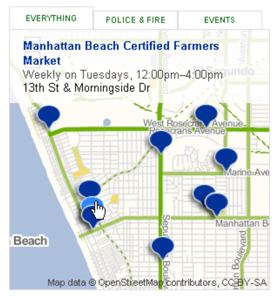AOL’s MapQuest announced today that it is launching an open-source mapping initiative, beginning with the U.K. and then heading to the United States. The project, available now at open.mapquest.co.uk, uses the new modern design and layout for MapQuest revealed last week in beta format. However, the data on the site comes from the OpenStreetMap community, an ongoing effort to create free and editable maps worldwide.

Along with the launch of “MapQuest Open,” as the project is called, AOL also announced a $1 million OpenStreetMap investment fund to support the growth of open-source mapping in the U.S. “MapQuest is the first large-scale mapping site to embrace the open-source community,” said Jon Brod, executive vice president of AOL Ventures, Local and Mapping.
$1 Million for OpenStreetMap
The fund is specifically targeted toward filling in gaps and adding data to the specific U.S. communities covered by AOL’s hyperlocal news, business and event listing resource, Patch. At present, Patch supports select communities in California, Connecticut, Illinois, Maryland, Massachusetts, New Jersey, New York and Rhode Island. Localized editions of Patch include embedded maps across the site’s many pages, displaying relevant news and events. The data on these maps already comes from OpenStreetMap, as opposed to MapQuest’s own service.

AOL’s head of engineering, Local and Mapping, Randy Meech, made the announcement of the company’s new initiatives at the fourth annual international OpenStreetMap conference, State of the Map 2010, in Girona, Spain. One of the slides from Meech’s presentation addresses the question many may have regarding this new project: “Why is it starting in the U.K., not the U.S.?” According to Meech, the U.K. and Germany are ahead in quality right now, and the “navigability needs improvement” in the U.S. The fund, obviously, should help with some of these issues.
Fighting Google and Bing with Open Source?
Steve Coast, founder of OpenStreetMap, praised AOL for its efforts, calling its move to join up with the open-source movement one that “represents rare foresight in recognizing that the future of map data will be a commons.”
But for AOL, the move is likely less about the feel-good aspect of supporting open source and more of a calculated business decision. Using open data will allow the company to quickly ramp up its maps with more information and details, including things like bike paths, hiking trails, parks and neighborhood streets, without having to invest significant funds in order to do so. While the end result may not have the whizz-bang of competitors like Google Maps or Bing Maps with their Street Views, map applications, Bird’s Eye views, 3D features and other advancements, the open maps may, in some cases, end up being more accurate thanks to the crowd-sourced data coming from local residents.
It’s a smart strategy for a brand whose name was once so aligned with mapping it actually became a verb: “Just MapQuest it.” Oddly enough, people often still say that today, but then head over to Google Maps instead. MapQuest hopes it’s not too late to change that.

















